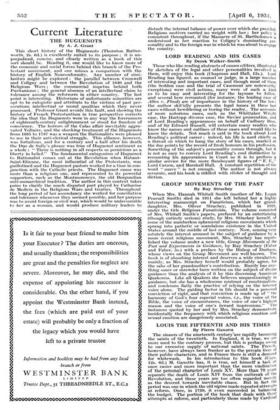Current Literature
THE HUGUENOTS
By A. J. Grant This short history of the HUguenOts (Thornton Butter-
worth, 2s. 6d.) is excellently suited to its purpose; is un- prejudiced, concise, and clearly written as a book of this sort should be. Reading it, one would like to know more of the economic and social forces behind this branch of the Pro- testant movement, and one misses a comparison with the history of English Nonconformity. Any number of simi- larities might be explored : the parallel between Cromwell and Coligny and between the Revolution of 1640 and the Religious Wars ; the commercial impetus behind both Puritanisms ; the general absence of an intellectual claim to tolerance among the reformers in either country. The last point is interesting. Historians of unfortunate minorities are apt to be eulogistic and attribute to the victims of past per- secutions intellectual or moral qualities which they never possessed. Professor Grant avoids this fault, and showing the history of French Protestantism in true perspective -corrects the idea that the Huguenots were in any way the forerunners of eighteenth-century enlightenMent or stood for freedom of conscience. The horrors of the Colas affair inevitably aggra- vated Voltaire, and the shocking treatment of the Huguenots from 1685 to 1787 was a weapon the Rationalists were pleased to use in their anti-clerical struggle. This alliance, however, was fortuitous, and for a century and a half after his death the Due de Sully's phrase was true of Huguenot sentiment as a whole : " There is nothing in all respects so pernicious as a liberty in belief." The fundamental antagonism of Huguenot to Rationalist comes out at the Revolution when Rabaut- Saint-Etienne, the most influential of the Protestants, was guillotined and the Huguenot pastors worked for a time in con- junction with the Catholic priests. The Huguenot cause was more than a religious one, and represented to its powerful supporters, such as the Montmorencys, the old Burgundian anti-monarchical tradition. The author in this context takes pains to clarify the much disputed part played by Catharine de Medicis in the Religious Wars and treaties. Throughout the long period of her ascendancy she worked for coneihaticin and tolerance whenever they seemed possible, and her purpose was to avoid foreign or civil war, which would be unfavourable to her as a woman, and would produce military leaders to disturb the internal balance of power over which she presided. Religious motives carried no weight with her • her policy is consistent throughout, if the Massacre of St. Bartholomew is understood as her reaction to Coligny's dominating per. sonality and to the foreign war in-which he was about to engage the country.








































 Previous page
Previous page